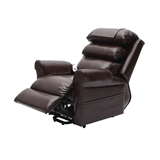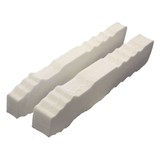This includes products containing devil’s claw, several of which have recently been approved by the UK drugs regulator, the Medicines and Healthcare products Regulatory Agency (MHRA), under its Traditional Herbal Registrations scheme. The trial results for this herb "are equivocal," says DTB.
An estimated 8.5 million people in the UK are thought to endure joint pain and other symptoms, potentially caused by osteoarthritis, which involves damage to cartilage and other structures in and around the joints—usually the knees, hips, and fingers.
Herbal medicines that have traditionally been used to treat osteoarthritis include vegetable extracts of avocado or soybean oils (ASUs), cat’s claw, devil’s claw, Indian frankincense, ginger, nettle, rosehip, turmeric and willow bark.
But, cautions DTB, few studies on the use of herbal medicines for osteoarthritis have been carried out. And those that have, frequently contain design flaws and limitations, such as variations in the chemical make-up of the same herb, all of which compromise the validity of the findings.
Furthermore, these studies have included insufficient numbers of patients and have not lasted very long, which is a particular issue for a long term condition, such as osteoarthritis, it says.
The clinical trial evidence, such as it is, indicates that ASUs, Indian frankincense, and rosehip, may work, and seem to produce few unwanted side effects, says DTB, but adds: "More robust data are needed."
As to the rest, the evidence in favour of their use is at best equivocal or unconvincing, it says.
Herbal medicines can also interfere with other medicinal products and prescription drugs, warns DTB.
"Herbal medicines can have significant pharmacological actions, and so can cause unwanted effects and have potentially dangerous interactions with other medicines (both herbal and conventional)," it says.
Extensive use of nettle, for example, can interfere with drugs used to treat diabetes, lower blood pressure, and depress the central nervous system, while willow bark can spark digestive symptoms and renal problems.
And some herbal medicines may also worsen the symptoms of other underlying conditions.
Nettle and cat’s claw should not be used in pregnancy, while the use of willow bark is ill advised in people with asthma, peptic ulcers, or those with clotting disorders, says DTB, by way of example.
"Herbal medicines have traditionally been used for the relief of osteoarthritis symptoms. However, there is a lack of licensed herbal medicinal products on the market for such symptoms, and none specifically licensed for osteoarthritis," concludes DTB.
"Also the efficacy and safety of such products is generally under researched and information on potentially significant herb-drug interactions is limited," it continues, advising doctors to routinely ask their patients with osteoarthritis if they are taking any herbal products.
- Suppliers
- New to MedicalSearch? Book a Demo
- Advertise with us
- Login
- Email Marketing
- Buyers
- Get Quotes
- Articles & Ideas
- Login
- Subscribe to newsletter
- My Details
- Get Quotes
- Accident & Emergency Care
- Aged Care & Disability
- Anaesthesia & Respiratory Care
- Beauty & Wellness
- Cardiology & Cardiac Surgery
- Commercial Cleaning & Laundry Supplies
- Dental Care & Oral Surgery
- Diagnostic Instruments & Medical Imaging
- Disinfection & Sterilisation
- ENT & Audiology
- Gynaecology & Obstetrics
- Homecare & Consumer Medical
- Hospital Equipment & Supplies
- Intensive Care Unit
- Laboratory & Pathology
- Medical Apparel
- Medical Devices & Products
- Medical Fridges & Freezers
- Medical Storage & Filing
- Medical Waste Management
- Optometry & Ophthalmology
- Orthopaedics & Podiatry
- Paediatrics & Neonatology
- Patient Monitoring & Management
- Physiotherapy & Rehabilitation
- PPE & Infection Control
- Single Use Medical Consumables
- Surgical Tools & Supplies
- Treatment Beds, Tables & Couches
- Veterinary Equipment
- Wheelchairs & Mobility Aids
- Get Quotes
- Accident & Emergency Care
- Aged Care & Disability
- Anaesthesia & Respiratory Care
- Beauty & Wellness
- Cardiology & Cardiac Surgery
- Commercial Cleaning & Laundry Supplies
- Dental Care & Oral Surgery
- Diagnostic Instruments & Medical Imaging
- Disinfection & Sterilisation
- ENT & Audiology
- Gynaecology & Obstetrics
- Homecare & Consumer Medical
- Hospital Equipment & Supplies
- Intensive Care Unit
- Laboratory & Pathology
- Medical Apparel
- Medical Devices & Products
- Medical Fridges & Freezers
- Medical Storage & Filing
- Medical Waste Management
- Optometry & Ophthalmology
- Orthopaedics & Podiatry
- Paediatrics & Neonatology
- Patient Monitoring & Management
- Physiotherapy & Rehabilitation
- PPE & Infection Control
- Single Use Medical Consumables
- Surgical Tools & Supplies
- Treatment Beds, Tables & Couches
- Veterinary Equipment
- Wheelchairs & Mobility Aids
Trusted by 520,000 Australian medical buyers
Buyers
- Discover products & solutions
- Login
- Subscribe To Newsletter
- Browse All Products
- Read Articles
Suppliers
Advertise
- Promote your products & solutions
- New to MedicalSearch? Book a Demo
- Login / Forgot Password
- Advertise Your Products
- Success Stories
- Email Marketing
- Suppliers
- Advertise with us
- Login
- Email Marketing
- Buyers
- Get Quotes
- Articles & Ideas
- Login
- Subscribe to newsletter
- My Details
Get Quotes
- Accident & Emergency Care
- Aged Care & Disability
- Anaesthesia & Respiratory Care
- Beauty & Wellness
- Cardiology & Cardiac Surgery
- Commercial Cleaning & Laundry Supplies
- Dental Care & Oral Surgery
- Diagnostic Instruments & Medical Imaging
- Disinfection & Sterilisation
- ENT & Audiology
- Gynaecology & Obstetrics
- Homecare & Consumer Medical
- Hospital Equipment & Supplies
- Intensive Care Unit
- Laboratory & Pathology
- Medical Apparel
- Medical Devices & Products
- Medical Fridges & Freezers
- Medical Storage & Filing
- Medical Waste Management
- Optometry & Ophthalmology
- Orthopaedics & Podiatry
- Paediatrics & Neonatology
- Patient Monitoring & Management
- Physiotherapy & Rehabilitation
- PPE & Infection Control
- Single Use Medical Consumables
- Surgical Tools & Supplies
- Treatment Beds, Tables & Couches
- Veterinary Equipment
- Wheelchairs & Mobility Aids
Get Quotes
- Accident & Emergency Care
- Aged Care & Disability
- Anaesthesia & Respiratory Care
- Beauty & Wellness
- Cardiology & Cardiac Surgery
- Commercial Cleaning & Laundry Supplies
- Dental Care & Oral Surgery
- Diagnostic Instruments & Medical Imaging
- Disinfection & Sterilisation
- ENT & Audiology
- Gynaecology & Obstetrics
- Homecare & Consumer Medical
- Hospital Equipment & Supplies
- Intensive Care Unit
- Laboratory & Pathology
- Medical Apparel
- Medical Devices & Products
- Medical Fridges & Freezers
- Medical Storage & Filing
- Medical Waste Management
- Optometry & Ophthalmology
- Orthopaedics & Podiatry
- Paediatrics & Neonatology
- Patient Monitoring & Management
- Physiotherapy & Rehabilitation
- PPE & Infection Control
- Single Use Medical Consumables
- Surgical Tools & Supplies
- Treatment Beds, Tables & Couches
- Veterinary Equipment
- Wheelchairs & Mobility Aids
Trusted by 520,000 Australian medical buyers
















